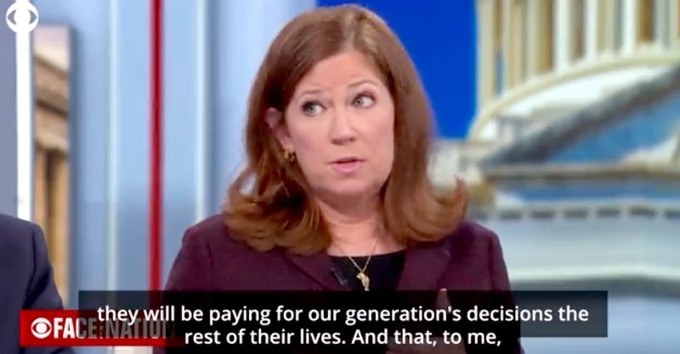
The most underreported story of 2021 was the “crushing impact” of COVID policies on kids, according to CBS News chief legal correspondent Jan Crawford.
During a Dec. 26, 2021 appearance on “Face the Nation,” Crawford slammed COVID policies, blaming them for a number of problems affecting children today, including the ongoing mental health crisis, increased suicide rates, and learning disruptions due to school closures.
Crawford said the risk of suicide attempts by girls is up 51%, while “black kids are twice as likely as white kids to die by suicide.”
“School closures, lockdowns, cancellation of sports — you couldn’t even go on a playground in the D.C. area without cops scurrying, shooing the kids off [and it had a] tremendous negative impact on kids, and it’s been an afterthought,” Crawford said. Crawford said healthy teenagers have “a one-in-a-million chance” of catching and dying of COVID, noting they have a greater chance of dying in a car accident.
“But they have suffered and sacrificed the most, especially kids and underrepresented at-risk communities,” Crawford said. “And now we have the Surgeon General saying there’s a mental health crisis among our kids.”
“They will be paying for our generation’s decisions the rest of their lives”: @JanCBS explains why she thinks 2021's biggest underreported story was the devastating impact of COVID policies on children pic.twitter.com/AUU1f6AFNi
— Face The Nation (@FaceTheNation) December 26, 2021
“If our policies don’t reflect a more measured and reasonable approach for our children, they will be paying for our generation’s decisions, the rest of their lives,” Crawford said. “And that, to me, is the greatest underreported story of the past year.”
Crawford’s comments come shortly after U.S. Surgeon General Vivek Murthy in early December issued a 53-page advisory on the youth mental health crisis saying the COVID pandemic “dramatically altered young peoples’ experiences at home, at school, and in the community.”
Murthy wrote:
“The pandemic era’s unfathomable number of deaths, pervasive sense of fear, economic instability, and forced physical distancing from loved ones, friends, and communities have exacerbated the unprecedented stresses young people already faced. It would be a tragedy if we beat back one public health crisis only to allow another to grow in its place.”






![Everything You Ever Wanted to Know About 9/11 Conspiracy Theory in Under 5 Minutes [VIDEO] | by James Corbett](https://consciouslifenews.com/wp-content/uploads/2018/09/911-a-conspiracy-theory-350x250.jpg)









![Everything You Ever Wanted to Know About 9/11 Conspiracy Theory in Under 5 Minutes [VIDEO] | by James Corbett](https://consciouslifenews.com/wp-content/uploads/2018/09/911-a-conspiracy-theory-120x86.jpg)
